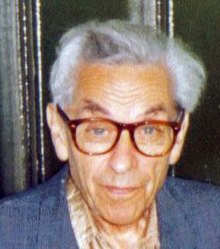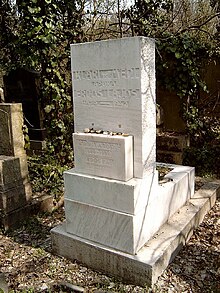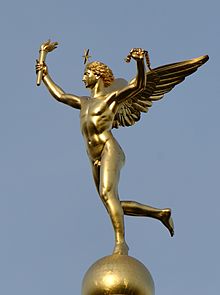 My
brain
is open!
My
brain
is open!
Paul Erdős
[also
Erd?s Pal
,
Pal Erd?s
,
Erdos
or
Erdos
] (
26 March
1913
?
20 September
1996
) was an immensely prolific and famously eccentric
mathematician
who, with
hundreds of collaborators
, worked on problems in
combinatorics
,
graph theory
,
number theory
,
classical analysis
,
approximation theory
,
set theory
and
probability theory
.
- I think that, as
Shelah
, a very clever young Israeli mathematician, once said, "I am an opportunist. I do what I can do." If there is anything in number theory that I can do, I certainly do it. But you see some of the problems in number theory are enormously difficult and many of these classic problems are very, very hard to make any progress in.
 If
numbers
aren't
beautiful
, I don't
know
what is.
If
numbers
aren't
beautiful
, I don't
know
what is.
 It is not enough to be in the right place at the right
time
. You should also have an open
mind
at the
right time
.
It is not enough to be in the right place at the right
time
. You should also have an open
mind
at the
right time
.
 This one's from the Book!
This one's from the Book!
 We'll continue tomorrow ? if I
live
.
We'll continue tomorrow ? if I
live
.
 What is the
purpose
of
Life
? ?
Proof
and conjecture, and keep the SF's score low.
What is the
purpose
of
Life
? ?
Proof
and conjecture, and keep the SF's score low.
- Another roof, another
proof
.
- His motto, as he roamed about the world, as the guest of other mathematicians, as quoted in
A Tribute to Paul Erd?s
(1990) edited by Alan Baker, Bela Bollobas, A. Hajnal, Preface, p. ix
- Suppose aliens invade the
earth
and threaten to obliterate it in a year's time unless
human
beings can find the
Ramsey number
for red five and blue five. We could marshal the world's best minds and fastest computers, and within a year we could probably calculate the value. If the aliens demanded the Ramsey number for red six and blue six, however, we would have no choice but to launch a preemptive attack.
- As quoted in "Ramsey Theory" by Ronald L. Graham and Joel H. Spencer, in
Scientific American
(July 1990), p. 112-117
- Television
is something the Russians invented to destroy American
education
.
- As quoted in
Comic Sections : The Book of Mathematical Jokes, Humour, Wit, and Wisdom
(1993) by
Des MacHale
- The SF created us to enjoy our suffering. … The sooner we die, the sooner we defy His plans.
- Some French socialist said that private
property
was theft … I say that private property is a
nuisance
.
- Referring to a famous statement by the French
anarchist
Pierre-Joseph Proudhon
that "Property is theft!", as quoted in
The Man Who Loved Only Numbers
(1998) by Paul Hoffman, p. 7
- My
brain
is open!
- A standard greeting he would make when he was not contemplating some mathematical problem, as quoted in
My Brain Is Open : The Mathematical Journeys of Paul Erdos
(1998) by Bruce Schechter, p. 10
- If
numbers
aren't
beautiful
, I don't
know
what is.
- Frequent remark, as quoted in
My Brain Is Open : The Mathematical Journeys of Paul Erdos
(1998) by Bruce Schechter, p. 14
- It is not enough to be in the right place at the right
time
. You should also have an open
mind
at the
right time
.
- My Brain Is Open : The Mathematical Journeys of Paul Erdos
(1998) by Bruce Schechter, p. 99
- Vegre nem butulok tovabb
- Finally I am becoming stupider no more.
- A suggestion for his own epitaph, as quoted in
Variety in Religion and Science: Daily Reflections
(2005) by Varadaraja Raman, p. 256
- We'll continue tomorrow ? if I live.
- Common remark when breaking off work for the night, as quoted in "The Magician of Budapest" in
The Edge of the Universe : Celebrating Ten Years of Math Horizons
(2007) by Deanna Haunsperger and Stephen Kennedy, p. 111
- This one's from the Book!
- Said in regard to any particularly beautiful or elegant proof, referring to a mythical "book" in which
God
wrote the proofs for all theorems, as quoted in
Philosophy of Mathematics
(2008) by John Francis, p. 51
- SF means Supreme
Fascist
? this would show that God is bad.
I don't claim that this is correct, or that God exists, but it is just sort of half a joke.
… As a joke I said, "What is the purpose of Life?" "
Proof and conjecture, and keep the SF's score low.
"
Now, the game with the SF is defined as follows:
If you do something bad the SF gets at least two points.
If you don't do something good which you could have done, the SF gets at least one point.
And if nothing ? if you are okay, then no one gets any point.
And the aim is to keep the SF's score low.
 God
may not play dice with the
universe
, but something
strange
is going on with the
prime numbers
. ~ A paraphrase of a fictional anecdote created by
Carl Pomerance
God
may not play dice with the
universe
, but something
strange
is going on with the
prime numbers
. ~ A paraphrase of a fictional anecdote created by
Carl Pomerance
- God
may not play dice with the
universe
, but something
strange
is going on with the
prime numbers
.
- Referencing
Albert Einstein
's famous remark that "God does not play dice with the universe", this is attributed to Erd?s in "Mathematics : Homage to an Itinerant Master" by D. Mackenzie, in
Science
275:759 (1997), but has also been stated to be a comment originating in a talk given by
Carl Pomerance
on the
Erd?s-Kac theorem
, in San Diego in January 1997, a few months after Erd?s's death. Confirmation of this by Pomerance is reported in a
statement posted to the School of Engineering, Computer Science & Mathematics, University of Exeter
, where he states it was a paraphrase of something he imagined Erd?s and
Mark Kac
might have said, and presented in a slide-show, which subsequently became reported in a newspaper as a genuine quote of Erd?s the next day. In his slide show he had them both reply to Einstein's assertion: "
Maybe so, but something is going on with the primes.
"
- A mathematician is a machine for turning coffee into theorems.
- Widely attributed to Erd?s, this actually originates with
Alfred Renyi
, according to
My Brain Is Open : The Mathematical Journeys of Paul Erd?s
(1998) by Bruce Schechter, p. 155
- Variant: A mathematician is a device for turning coffee into theorems.
- The first sign of senility is that a man forgets his theorems, the second sign is that he forgets to zip up, the third sign is that he forgets to zip down.
- Though Erd?s used this remark, it is said to have originated with his friend
Stanisław Ulam
, as reported in
The Man Who Loved Only Numbers : The Story of Paul Erd?s and the Search for Mathematical Truth
(1998) by
Paul Hoffman
- Variants:
- The first sign of senility is when a man forgets his theorems. The second sign is when he forgets to zip up. The third sign is when he forgets to zip down.
- As quoted in
Wonders of Numbers : Adventures in Mathematics, Mind, and Meaning
(2002) by Clifford A. Pickover, p. 64
- There are three signs of senility. The first sign is that a man forgets his theorems. The second sign is that he forgets to zip up. The third sign is that he forgets to zip down.
Quotes about Erd?s
[
edit
]
 A conjecture thought to be sound
A conjecture thought to be sound
Was that every
circle
was round
In a paper of Erd?s
written in Kurdish
A counterexample is found!
- Sorted alphabetically by author or source
 Erd?s
knows
about more
problems
than anybody else, and he not only knows about various problems and conjectures, but he also knows the
tastes
of various
mathematicians
. ~
Bela Bollobas
Erd?s
knows
about more
problems
than anybody else, and he not only knows about various problems and conjectures, but he also knows the
tastes
of various
mathematicians
. ~
Bela Bollobas
 He loves areas of
mathematics
which do not require an excessive amount of technical
knowledge
but give scope for
ingenuity
and surprise. The mathematics of Paul Erd?s is the mathematics of
beauty
and
insight
. ~
A Tribute to Paul Erd?s
He loves areas of
mathematics
which do not require an excessive amount of technical
knowledge
but give scope for
ingenuity
and surprise. The mathematics of Paul Erd?s is the mathematics of
beauty
and
insight
. ~
A Tribute to Paul Erd?s
 One of my greatest
regrets
is that I didn't know him when he was a million times faster than most
people
. When I knew him he was only hundreds of times faster. ~
Neil Calkin
One of my greatest
regrets
is that I didn't know him when he was a million times faster than most
people
. When I knew him he was only hundreds of times faster. ~
Neil Calkin
 He was the
Bob Hope
of
mathematics
, a kind of vaudeville performer who told the same
jokes
and the same
stories
a thousand times. ~
Melvyn Nathanson
He was the
Bob Hope
of
mathematics
, a kind of vaudeville performer who told the same
jokes
and the same
stories
a thousand times. ~
Melvyn Nathanson
 Want to meet Erdos? … Just stay here and wait. He'll show up.
Want to meet Erdos? … Just stay here and wait. He'll show up.
 He loved to play silly tricks to amuse
children
and to make sly
jokes
and thumb his nose at
authority
. But most of all, Erd?s loved those who loved
numbers
,
mathematicians
. ~ Bruce Schechter
He loved to play silly tricks to amuse
children
and to make sly
jokes
and thumb his nose at
authority
. But most of all, Erd?s loved those who loved
numbers
,
mathematicians
. ~ Bruce Schechter
 Nothing bothered Erd?s more than
political
structures which did not allow for complete
freedom
of expression and the
ability
to
travel
freely. ~ Peter Schumer
Nothing bothered Erd?s more than
political
structures which did not allow for complete
freedom
of expression and the
ability
to
travel
freely. ~ Peter Schumer
- Erd?s knows about more problems than anybody else, and he not only knows about various problems and conjectures, but he also knows the
tastes
of various mathematicians.
So if I get a letter from him giving me three of his conjectures and two of his problems, then it's sure that these are
exactly
the kind of conjectures and problems I'm interested in, and these are exactly the kind of questions I
may
be able to answer.
Of course, this applies not only to me, but to everybody else. So
Erd?s has an amazing ability to match problems with people. Which is why so many mathematicians benefit from his presence.
Every letter is likely to inspire you to do some work, or every phone call will give you some problems you are interested in.
- Paul Erd?s is the consummate problem solver: his hallmark is the succinct and clever argument, often leading to a solution from "the book".
He loves areas of mathematics which do not require an excessive amount of technical knowledge but give scope for ingenuity and surprise. The mathematics of Paul Erd?s is the mathematics of beauty and insight.
- One of my greatest regrets is that I didn't know him when he was a million times faster than most people. When I knew him he was only hundreds of times faster.
- Neil Calkin
, one of Erd?s's last collaborators, as quoted in
My Brain Is Open : The Mathematical Journeys of Paul Erdos
(1998) by Bruce Schechter, p. 119
- Hungarian mathematician Paul Erd?s, although an atheist, spoke of an imaginary book, in which God has written down all the most beautiful mathematical proofs. When Erd?s wanted to express particular appreciation of a proof, he would exclaim "
This one's from the Book!
". This viewpoint expresses the idea that mathematics, as the intrinsically true foundation on which the laws of our universe are built, is a natural candidate for what has been personified as God by different religious mystics.
- John Francis, in
Philosophy of Mathematics
(2008), p. 51
- He was an absolutely wonderful man. He was interested in everything.
You felt right away that you are not dealing with one of your colleagues or an average guy. He was a genius, his thoughts were all over the place. I've met very smart people. I have never met a genius before. …
He basically disregarded any disciplined approach to anything.
- Dr. Jonas Gellert, his cardiologist, as quoted in
My Brain Is Open : The Mathematical Journeys of Paul Erdos
(1998) by Bruce Schechter, p. 119
- Probably the greatest mathematician of the twentieth century, Paul Erd?s … was so eccentric that he made
Einstein
look normal.
He was 11 before he ever tied his shoes, 21 before he ever buttered toast, and died without ever boiling an egg.
Erd?s lived on the road, traveling from conference to conference, owning nothing but math notebooks and a suitcase or two. His life consisted of math, nothing else.
- Clifford Goldstein, in
The Mules That Angels Ride
(2005), p. 125
- This book is dedicated to Paul Erdos, who not only possessed the art of asking the right question, but of asking it of the right person.
- Richard K. Guy
in
Unsolved Problems in Number Theory
, 3rd Edition (2004)
- The SF is the Supreme Fascist, the Number-One Guy Up There, God, who was always tormenting Erd?s by hiding his glasses, stealing his Hungarian passport, or, worse yet, keeping to Himself the elegant solutions to all sorts of intriguing mathematical problems.
- He wrote or co-authored 1,475 academic papers, many of them monumental, and all of them substantial.
It wasn't just the quantity of work that was impressive but the quality: "There is an old saying," said Erd?s. "
Non numerantur, sed ponderantur
(
They are not counted but weighed
).
- Paul Hoffman
, in
The Man Who Loved Only Numbers : The Story of Paul Erd?s and the Search for Mathematical Truth
(1998), p. 6
- In a never-ending search for good mathematical problems and fresh mathematical talent, Erd?s crisscrossed four continents at a frenzied pace, moving from one university or research center to the next.
His modus operandi was to show up on the doorstep of a fellow mathematician, declare, "
My brain is open
," work with his host for a day or two, until he was bored or his host was run down, and then move on to another home.
Erd?s's motto was not "Other cities, other maidens" but "
Another roof, another proof.
" He did mathematics in more than 25 different countries, completing important proofs in remote places and sometimes publishing them in equally obscure journals.
- Paul Hoffman
, in
The Man Who Loved Only Numbers : The Story of Paul Erd?s and the Search for Mathematical Truth
(1998), p. 6
- His language had a special vocabulary ? not just "the SF" [God] and "epsilon" [child] but also "bosses" (women), "slaves" (men), "captured" (married), "liberated" (divorced), "recaptured" (remarried), "noise" (music), "poison" (alcohol), "preaching" (giving a mathematics lecture), "Sam" (the United States), and "Joe" (the Soviet Union).
When he said someone had "died," Erd?s meant that the person had stopped doing mathematics. When he said someone had "left," the person had died.
- Paul Hoffman
, in
The Man Who Loved Only Numbers : The Story of Paul Erd?s and the Search for Mathematical Truth
(1998), p. 8
- In the late 1980s Erd?s heard of a promising high school student named
Glen Whitney
who wanted to study mathematics at Harvard but was a little short the tuition. Erd?s arranged to see him and, convinced of the young man's talent, lent him $1,000. He asked Whitney to pay him back only when it would not cause financial strain. A decade later
Graham
heard from Whitney, who at last had the money to repay Erd?s. "Did Erd?s expect me to pay interest?" Whitney wondered. "What should I do?" he asked Graham. Graham talked to Erd?s.
"Tell him," Erd?s said, "to do with the $1,000 what I did."
- Paul Hoffman
, in
The Man Who Loved Only Numbers : The Story of Paul Erd?s and the Search for Mathematical Truth
(1998), p. 10
- As a mathematician
Erdos
is what in other fields is called a "natural". If a problem can be stated in terms he can understand, though it may belong to a field with which he is not familiar, he is as likely as, or even more likely than, the experts to find a solution.
- Paul Erd?s (1913?1996) was once told that a friend of his had shot and killed his wife. Without blinking an eye, Erd?s said, "Well, she was probably interrupting him when he was trying to prove a theorem."
- In the early 1960s, when I was a student at University College London … Erd?s came to visit us for a year.
After collecting his first month's salary he was accosted by a beggar on Euston station, asking for the price of a cup of tea. Erd?s removed a small amount from the pay packet to cover his own frugal needs and gave the remainder to the beggar.
- D. G. Larman
, as quoted in
The Man Who Loved Only Numbers : The Story of Paul Erd?s and the Search for Mathematical Truth
(1998) by Paul Hoffman, p. 10
- A conjecture both deep and profound
Is whether a circle is round.
In a paper of Erd?s
Written in Kurdish
A counterexample is found.
- Limerick attributed to
Leo Moser
, in
Handbook of Combinatorics
(1995) edited by Ronald L. Graham, Ch. 17
- Variant:
- A conjecture thought to be sound
Was that every circle was round
In a paper of Erd?s
written in Kurdish
A counterexample is found!
- Attributed to an unnamed colleague, quoted in "The Magician of Budapest" by Peter Schumer, in
The Edge of the Universe : Celebrating Ten Years of Math Horizons
(2007) by Deanna Haunsperger and Stephen Kennedy, p. 110
- He was the
Bob Hope
of mathematics, a kind of vaudeville performer who told the same jokes and the same stories a thousand times. … When he was scheduled to give yet another talk, no matter how tired he was, as soon as he was introduced to an audience, the adrenaline (or maybe amphetamine) would release into his system and he would bound onto the stage, full of energy, and do his routine for the 1001
st
time.
- Melvyn Nathanson
, as quoted in
The Man Who Loved Only Numbers : The Story of Paul Erd?s and the Search for Mathematical Truth
(1998), p. 11
- "
Want to meet Erdos?
" mathematicians would ask. "
Just stay here and wait. He'll show up.
"
- Bruce Schechter, in
My Brain Is Open : The Mathematical Journeys of Paul Erdos
(1998), p. 14
- He loved to play silly tricks to amuse children and to make sly jokes and thumb his nose at authority. But most of all, Erd?s loved those who loved numbers, mathematicians.
- Bruce Schechter, in
My Brain Is Open : The Mathematical Journeys of Paul Erdos
(1998), p. 17
- Twenty hours of work a day was not unusual. Upon arriving at a meeting, he would announce, in his thick Hungarian accent, "
my brain is open.
" At parties, he would often stand alone oblivious to all else, deep in thought pondering some difficult argument.
- Peter Schumer in "The Magician of Budapest" in
The Edge of the Universe : Celebrating Ten Years of Math Horizons
(2007) by Deanna Haunsperger and Stephen Kennedy, p. 110
- Nothing bothered Erd?s more than political strictures which did not allow for complete freedom of expression and the ability to travel freely.
… Always traveling with a single shabby suitcase which doubled as a briefcase, he had little need or interest in the material world.
- Peter Schumer in "The Magician of Budapest" in
The Edge of the Universe : Celebrating Ten Years of Math Horizons
(2007) by Deanna Haunsperger and Stephen Kennedy, p. 110
 Wikipedia
Wikipedia
 Commons
Commons